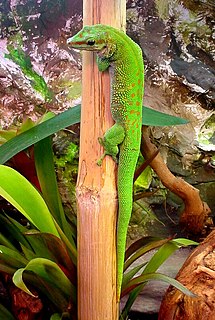
The Madagascar day gecko is a diurnal species of gecko. It lives on the eastern coast of Madagascar and typically inhabits rainforests and dwells on trees. The Madagascar day gecko feeds on insects, fruit and nectar.
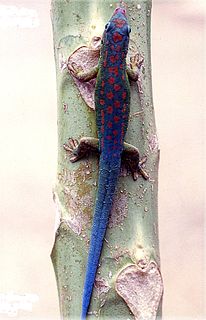
The blue-tailed day gecko is a diurnal species of gecko, a lizard in the family Gekkonidae. The species is endemic to the island Mauritius. It typically inhabits warm and humid places and dwells on different trees and bushes.

Phelsuma dubia, dull day gecko, olive day gecko, Zanzibar day gecko, or green day gecko is a diurnal species of gecko. It is about 15 centimetres (5.9 in) in length and lives on the western coast of Madagascar, in the Comoros, and the coast of East Africa. It typically inhabits trees and can also be found near human dwellings. The Dull day gecko feeds on insects and nectar.
Agalega day gecko is a subspecies of geckos.
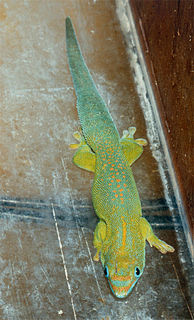
The yellow-throated day gecko is an endangered diurnal species of gecko from eastern Madagascar. It typically inhabits rainforests and dwells on trees. The yellow-throated day gecko feeds on insects and nectar.
Mauritius upland forest day gecko is a diurnal species of geckos.

The speckled day gecko is a diurnal species of geckos. It lives in eastern Madagascar and typically inhabits rainforests and dwells on trees. The speckled day gecko feeds on insects and nectar.

The yellow-headed day gecko, also commonly called Klemmer's day gecko, or the cheerful day gecko, is a small diurnal species of gecko, a lizard in the family Gekkonidae. This endangered species is endemic to northwestern Madagascar and inhabits coastal forests, dwelling on bamboo. The yellow-headed day gecko feeds on insects and nectar.

The gold dust day gecko is a diurnal species of gecko. It lives in northern Madagascar, and on the island of Comoros; it has also been introduced to Hawaii and other Pacific islands. It's typically seen in houses and various trees. The gold dust day gecko feeds on insects and nectar. It is commonly known as the mascot of GEICO.

Koch's giant day gecko is a diurnal subspecies of gecko, a lizard in the family Gekkonidae. The subspecies is native to northwestern and western Madagascar and typically inhabits trees. It feeds on insects and nectar.

The flat-tailed day gecko is a diurnal gecko lives in eastern Madagascar. It is endangered due to illegal collection for the international pet trade. It typically inhabits rainforests and dwells on trees. The flat-tailed day gecko feeds on insects and nectar.
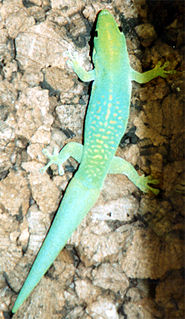
Phelsuma v-nigra v-nigraBoettger, 1913 is a small diurnal subspecies of geckos. It lives in the Comoros and typically inhabits trees and bushes. Phelsuma v-nigra v-nigra feeds on insects and nectar.
The Grand Comoro Day Gecko is a small diurnal subspecies of geckos. It lives in the Comoros and typically inhabits trees and bushes. The Grand Comoro day gecko feeds on insects and nectar.
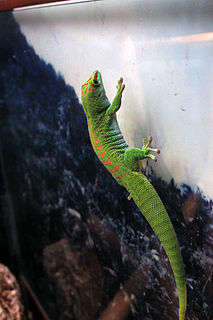
Seychelles giant day gecko is diurnal subspecies of geckos. It lives on the island Praslin in the Seychelles and typically inhabits trees and dwellings. The Seychelles giant day gecko feeds on insects and nectar.
Phelsuma sundbergi ladiguensis is a diurnal subspecies of Phelsuma sundbergi. It lives on the islands Ladigue, Felicite and Cocco in the Seychelles, and typically inhabits trees and dwellings. The Seychelles giant day gecko feeds on insects and nectar.

Mahé day gecko is a diurnal subspecies of geckos. It lives on the western granite islands of the Seychelles and typically inhabits trees and human dwellings. The Seychelles giant day gecko feeds on insects and nectar.
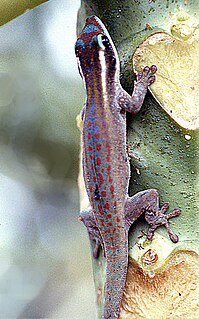
Mauritius ornate day gecko is a diurnal species of gecko. It occurs on the island Mauritius and some surrounding islands and typically inhabits different trees and bushes. The Mauritius ornate day gecko feeds on insects and nectar.
The Phelsuma pusilla pusillaMertens, 1964 is a diurnal gecko and lives in eastern Madagascar. It typically inhabits different trees and houses. This day gecko feeds on insects and nectar.
Phelsuma pusilla hallmanni is a diurnal subspecies of gecko, a lizard in the family Gekkonidae. The subspecies is endemic to eastern Madagascar and typically inhabits different trees. This day gecko feeds on insects and nectar.

Phelsuma kely is a species of diurnal gecko which lives on the central east coast of Madagascar, south of Tamatave. It typically inhabits dragon trees. The gecko feeds on insects and probably nectar.













